Our Lenten Journey – Preparing for the Passion and Resurrection of Our Lord

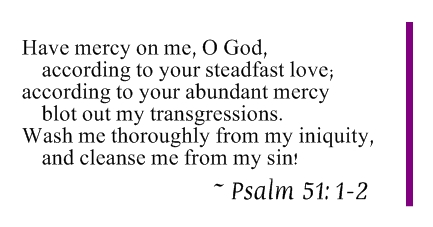 Lent is a time for self-examination and intentionally focusing on developing a greater awareness of our dependence on God. It is a time to improve ourselves and our relationship with God.
Lent is a time for self-examination and intentionally focusing on developing a greater awareness of our dependence on God. It is a time to improve ourselves and our relationship with God.
Lent is an opportunity for greater works of mercy and charity for others – a time for the visitation of the sick, assistance to the poor, hospitality and, generally, developing a more joyful relationship with those around us – family and friends and our neighbours, our brothers and sisters in Christ. Most of all, Lent is a time of joy and new beginning. We cleanse ourselves – mind, body and soul – through physical and spiritual discipline and fasting, keeping a Christian attitude in all we do. All in preparation for the Great Feast of Pascha (Easter) – the Resurrection of Christ.
What follows are some ideas meant to be of assistance to you on your Lenten journey – May God bless you and guide you, and may you reach your Paschal destination with the joy of renewed faith in Christ!

Self-examination and repentance: It is no coincidence that our Lent begins with an act of repentance and confession on Ash Wednesday. When we fall away from God, we have removed ourselves from His communion – with Him and with other Christians. We have excommunicated ourselves. To re-enter communion with God is the on-going activity of all Christians. We fall away daily in some way or another – no one is exempt. Repentance offers us the opportunity of a new beginning – a “do over”. We are telling God that we have changed our mind about our past direction and want to be back in communion with Him. The Greek word for repentance, metanoia – implies a deep change in the way we see ourselves, our world, and our relationship with God. On this first step of our Lenten journey we leave behind regret and move toward hope. Repentance is not a single act – it is a new attitude and frame of mind…and heart!
Using this time of Lent to examine our hearts and minds we can think back over our lives and identify things we regret having said, done, or, not done. Was it something hurtful, inconsiderate, selfish, or deceitful? We should think over those things which may not have directly affected another, but which we know to be wrong according to the teachings of the Church. Bring them to mind and turn them into repentance.
If we are to be forgiven of God, He asks that we also forgive one another. Metropolitan Anthony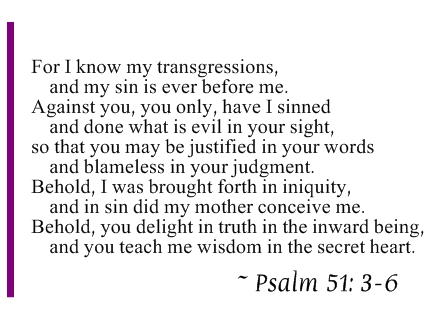 Bloom has suggested that each of us should be brought to a full stop each time we pray the Lord’s Prayer and reach the petition that God should “forgive us our trespasses as we forgive those who trespass against us”. We should examine our hearts and minds to determine have we forgiven others – as we ask God to forgive us? The act of forgiving is, indeed, an act of love. And, our confession and repentance become an act of love and trust in God’s love for us.
Bloom has suggested that each of us should be brought to a full stop each time we pray the Lord’s Prayer and reach the petition that God should “forgive us our trespasses as we forgive those who trespass against us”. We should examine our hearts and minds to determine have we forgiven others – as we ask God to forgive us? The act of forgiving is, indeed, an act of love. And, our confession and repentance become an act of love and trust in God’s love for us.
On page 555 of the Book of Common Prayer, we are reminded that: Every Christian man or woman should from time to time frame for themselves a RULE OF LIFE in accordance with the precepts of the Gospel and the faith and order of the Church; wherein they may consider the following:
- The regularity of their attendance at public worship and especially at the holy Communion.
- The practice of private prayer, Bible-reading, and self-discipline.
- Bringing the teaching and example of Christ into their everyday life.
- The boldness of their spoken witness to their faith in Christ.
- Their personal service to the Church and the community.
- The offering of money according to their means for the support of the work of the Church at home and overseas.
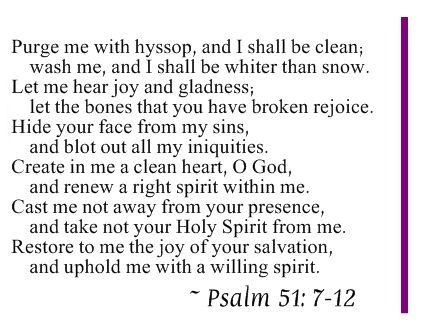 Consider using this Rule of Life as a start to your own self-examination on a daily basis during Lent. And, remember, what we are taught in the Exhortation (BCP, pp 90-91), if there be any of you, who … cannot quiet their own conscience, but requires further comfort or counsel, let them come to their priest, or to some other discreet Minister of God’s Word, and open their grief; that by the ministry of God’s holy Word, they may receive the benefit of absolution, together with spiritual counsel and advice, (private/sacramental confession) to the quieting of their conscience, and the avoiding of all scruple and doubtfulness.
Consider using this Rule of Life as a start to your own self-examination on a daily basis during Lent. And, remember, what we are taught in the Exhortation (BCP, pp 90-91), if there be any of you, who … cannot quiet their own conscience, but requires further comfort or counsel, let them come to their priest, or to some other discreet Minister of God’s Word, and open their grief; that by the ministry of God’s holy Word, they may receive the benefit of absolution, together with spiritual counsel and advice, (private/sacramental confession) to the quieting of their conscience, and the avoiding of all scruple and doubtfulness.
Prayer, Fasting and Self-denial: We’ve all heard about “giving up” something for Lent (often sweets or some other indulgence or luxury). This is “self-denial”. It is a fairly minor sacrifice of something for the Lenten season. Like all Lenten disciplines it is not supposed to be a sort of spiritual ‘heroics’ or showing off, but an outward aid to humbling ourselves before God inwardly and to increase our awareness of our total dependence on God’s mercy in Christ. Our tiny discomforts remind us of Christ’s much greater sufferings for us – in his 40-day strict fast and Passion.
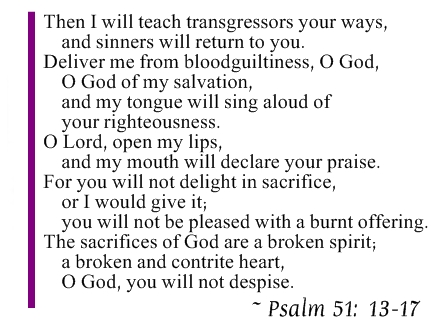
Little acts of self-denial are good starts to keeping Lent and to introduce children to the practice of abstaining from foods or other ‘treats’ they enjoy (like screen-time, etc) on certain days or the whole season. A fitting thing to do is to also ‘take up’ something in place of that thing. Donating more time, energy or money to someone or something worthwhile with what has been ‘freed up’ by the self-denial is very appropriate.
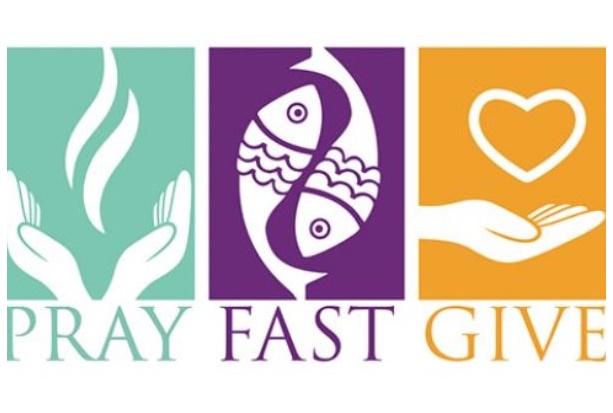 Something we should all “take up” in Lent is to seek more quiet and fewer distractions; to give more attention to God in prayer and Scripture and to our neighbour (or family) by listening, sharing, and loving service. Quiet, silence, listening and music all tend to draw us to a deeper and nearer relationship to God and neighbour. The constant background ‘noise’ of our world tends to break down those relationships, and make us more distant and broken.
Something we should all “take up” in Lent is to seek more quiet and fewer distractions; to give more attention to God in prayer and Scripture and to our neighbour (or family) by listening, sharing, and loving service. Quiet, silence, listening and music all tend to draw us to a deeper and nearer relationship to God and neighbour. The constant background ‘noise’ of our world tends to break down those relationships, and make us more distant and broken.
Like self-denial, fasting is meant to physically make ‘more room’ for God and neighbour. The time and money saved on eating less (and, perhaps also less ‘fancy’ food) can be ‘spent’ on our neighbour – whether they are in need of food, clothing, etc, or just a sympathetic ear over a cup of tea. By ‘emptying’ ourselves a little we can be filled with more attention to those in need.
Prayer and fasting are united in Biblical teaching. Fasting is an aid to increase the intensity and earnestness of our prayer. Sometimes Church causes will call for a national or international day of prayer and fasting. Governments even used to do such things. Again, it is about outwardly emptying and humbling ourselves to inwardly be more open and receptive to God. Fasting is, in the first place, about food – intentionally going without one or two meals each day we fast and making the meal(s) we do take more simple (and, perhaps more healthy too). It is not about dieting or losing weight, but about focussing more on our ‘spiritual diet’. Prayer, fasting and Scripture go together as a strong 3-thread cord. Our Lord in the Gospel for the Third Sunday in Lent warns about creating a spiritual vacuum – the parable of the man delivered from one demon, leaving himself empty of evil but not filled with God and ending up possessed 8-fold! (Luke 11:14-26 (Book of Common Prayer, p 146)). This reminds us that fasting and self-denial – without prayer – are actually dangerous. Being ‘empty’ can make room for God – but, also for less healthy spiritual forces like pride and self-satisfaction. Prayer must accompany our fasting or else we are out on a ledge trusting only in our own strength to defend us. Prayer allows the Holy Spirit to fill us and guide us, to defend us and protect us with His indwelling grace and presence.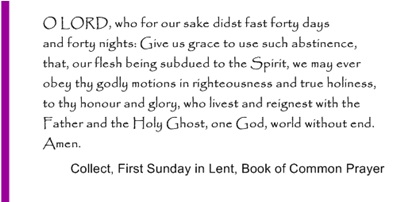
Jesus taught his disciples that some forces of evil only are defeated by prayer AND fasting. Our feeble efforts at fasting and self-denial are only helpful if we pray for the strength of Christ to come to our aid, just as he was tempted and overcame the devil ‘for our sakes’ in His own 40-day fast (see the Collect and Gospel in the Book of Common Prayer for the First Sunday in Lent, pp 140-141). Jesus obviously kept His fast with deep prayer.
Fasting and prayer, however, are not enough alone to cleanse and defend us spiritually. In His own wilderness temptations, Jesus armed Himself powerfully with the Word of God – Scripture. Each defeat of Satan’s temptations was by a heart-felt, convicted answer rooted in and framed by Scripture. Our prayers can become distorted, unfocussed and even self-centred and selfish if they are not rooted and grounded thoroughly in Scripture. Among other things, our system of “Common Prayer” in the Anglican tradition strongly welds together Scripture and prayer.

Reading & Meditation upon God’s Holy Word: As mentioned previously, our beautiful Anglican system of daily “Common Prayer”, strongly unites our prayer life with the Bible. Part of the joy of Lent is that in simplifying our lives for a season – less food, less distraction, less noise, less focus on ourselves – we can make more room for God and our neighbour and become more attentive and ‘present’ to both. We need Scripture to direct and guide us in all we do, and especially when we are seeking to grow in grace, in the knowledge and love of God and service to our neighbour. Like all aspects of “the observance of a holy Lent” (Book of Common Prayer, p. 612), the focus is to die to self and sin and live for Christ and his righteousness. Lent reminds us of “the need which all Christians continually have, of a renewal of their repentance and faith” (Lenten Exhortation, Book of Common Prayer, p. 612).
In Scripture – God’s Word written, as the Prayer Book calls it – we are able to have a living encounter with the Living Word, Jesus Christ himself. Not just the Gospels, but the entire Bible – Old Testament as well as the New Testament – is about Christ. He fulfills the Old Testament Law and Prophets, which also point to Him as their own completion. The Psalms, as both the hymn book and ‘prayer book’ of ancient Israel, were Jesus’ prayer book too, and are reflected in His ministry and teaching as well as His prayer. Reciting the psalms prayerfully each day (as in our Morning and Evening Prayer) are powerful ways to enter into prayer with and through Christ himself.
 The Prayer Book system of daily common prayer takes us into a prayerful attitude through the Psalms (praying them in Christ) and on into the Old Testament and New Testament lessons in that same prayerful attitude. This helps us ‘soak’ in the Scriptures and thus bask in Christ’s presence and his revealed Truth. Without being grounded in Scripture we cannot live a truly Christian life. A Father of the Early Church (and early translator of the Bible) St. Jerome says, “Ignorance of Scripture is ignorance of Christ”. So, the Bible is crucial to our Christian life at all times. In Lent we are called to deepen and intensify our ‘reading and meditation upon God’s holy Word”.
The Prayer Book system of daily common prayer takes us into a prayerful attitude through the Psalms (praying them in Christ) and on into the Old Testament and New Testament lessons in that same prayerful attitude. This helps us ‘soak’ in the Scriptures and thus bask in Christ’s presence and his revealed Truth. Without being grounded in Scripture we cannot live a truly Christian life. A Father of the Early Church (and early translator of the Bible) St. Jerome says, “Ignorance of Scripture is ignorance of Christ”. So, the Bible is crucial to our Christian life at all times. In Lent we are called to deepen and intensify our ‘reading and meditation upon God’s holy Word”.
We can start by just making more time and quiet with our daily time in Scripture, to be still and truly hear God speaking. We can spend time after prayer meditating on the passages (there are many traditional ways of doing this, which your priest is happy to discuss with you), and asking God’s help in applying the teaching to our lives. The Bible will both comfort us and challenge us. It will convict us of our sin and lead us to see wider opportunities for loving service.
Another way to grow in our knowledge and love of God through Scripture is to take on more time and effort to give to the study of Scripture (just as we try to make more time for prayer and worship opportunities offered in Lent). We can start, re-start, or renew attendance at Bible study(ies). We can read Bible commentary on our daily Scripture lessons (your priest can give you advice on commentaries). We can read a devotional or other spiritual book or booklet to deepen our understanding or appreciation of the Faith (again, your priest can offer suggestions). Sometimes just take more time to ‘sit’ with the daily readings and, if your Bible has footnotes or study notes, read those.
All of these are good ways to deepen our love of the Word and our relationship with Christ. As stated at the beginning, the Book of Common Prayer beautifully connects Scripture and prayer at all times – and, during Lent also commends fasting and other observances to us. A healthy, balanced spiritual ‘diet’ frees us more and more to surrender as disciples (learners, followers) of Christ and to fulfill the calling of our Baptism:
to follow our Saviour Christ, and to be made like unto him; that as he died and rose again for us, so should we, who are baptized, die from sin, and rise again unto righteousness, continually mortifying all evil desires, and daily increasing in all virtue and godliness of living. (Book of Common Prayer, p. 530)
May we all seek God’s grace to make full use of the opportunities this coming season of Lent will give us. May it deepen and beautify our ability to “observe with great devotion the days of Lord’s Passion and Resurrection.” (Lenten Exhortation, Book of Common Prayer, p. 611)